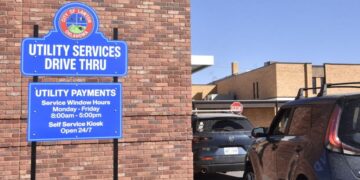Two Lawton auto repair shop owners have some advice for car owners: Take good care of what you have.
Randy Warren of Warrens Imports and Dan Crawford of Dan Crawford’s Autoplex said independent car repair shops already are facing shortages and delivery delays of car parts, a problem with its roots in the COVID-19 pandemic. The problem could become more pronounced if predictions are true that the auto workers strike will continue and impact plants that make car parts
“I don’t know that the strike will be causing a problem early on,” Warren said. “Depending on how long it drones on, there is more possibility that access to parts will start to diminish.”
Warren said if conditions follow the trend that started during COVID, there will be fewer and fewer parts for older model vehicles. He said that is because car manufacturers don’t make parts; they source what they need from parts manufacturers.
“When those orders start diminishing, those factories will shut down,” Warren said. “That causes a lag in the supply chain.”
He said factories making specific parts are being shut down to save money and to ensure they don’t overstock warehouses. The problem: there must be a reason to restart those factories once the crisis is over, and that reason may not be there anymore. In fact, it may be more profitable to tool up for a new part rather than to build the old one that fewer people need.
That fact is a reflection of how cars are made today. Warren said years ago, every car had one model that essentially used the same part for two or three years. Today, especially for cars made since 2000, every make and model uses different parts. So, rather than having parts that fit multiple cars spread over two or three years, there are specific parts that can be used on only one model.
“That makes it really difficult for that supplier to tool back up,” Warren said of the financial decision involved in restarting a manufacturing plant for parts that fit only 5,000 cars. The fewer number of vehicles made in a specific model, the greater the likelihood of not being able to find parts in the near future, he said.
The vehicle also makes a difference, said Warren, who specializes in imports. He said one customer needed a simple wheel part for his Jaguar. The stateside dealer didn’t supply it, and when they called the factory in England, they were told it wasn’t made any more. That left the customer with the option of buying a used one and the only used part that could be found came with the entire assembly — at a higher price.
“That makes it very difficult, especially on specialized cars,” he said.
Difficulty is a fact of life for independent car repair shops, Crawford said.
“We’re already going through it,” he said about shortages and delays in getting parts to repair vehicles, adding it doesn’t matter whether the parts are for old vehicles or new ones.
Crawford’s clientele is varied, with all types of makes and models going back to the 1970s and 1980s. But the problem is the same: if you need a specific part, be ready to wait. If it is a major part, such as a transmission, that wait will be months (four to six months is common). Even more minor repairs, such as brakes and headlights, means waiting days for parts. The wait time for parts on newer-model cars can be even longer, depending on what you need.
“We can wait six months to a year,” Crawford said, of 2000 model year or newer vehicles.
He cited one Ford owner has been waiting since the middle of January for the part his vehicle needs. Even when that part arrives, he will wait because Crawford has to address repairs in the order he received the vehicles. While most customers are multi-vehicle families who can work around being a vehicle short, there are some who have only one car.
Crawford said a lot of the problem stems from shutdowns during the COVID-19 pandemic, and if what he is hearing is accurate, that problem could become even worse if the auto workers strike closes manufacturing plants for an extended period.
Other problems complicate the matter. For example, Crawford said car repair shops have the same problem most other businesses do: getting enough employees. In other instances, manufacturers have stopped making parts for some models and that means somewhere down the road, it won’t be possible to get parts to repair those vehicles.
Crawford said he also knows some shortages occurred after the U.S. increased tariffs on items made overseas. Many auto parts fall into that category, he said, adding there also have been problems with slowing down shipments. The result is a smaller number of sites stocking auto parts. While auto dealers tend to have those parts, auto parts stores can’t get them and that, in turn, means they can’t sell them to independent repair shops.
“We can’t get parts,” he said, adding some of those stores that have been able to continue supplying parts are getting anxious as their supplies dwindle.
So, what is the best thing car owners can do?
“Keep the car you’ve got maintained,” Warren said. “Maintenance and keeping the car in good shape is the best thing you can do to try to weather this situation we’re in.”
“Keep it up,” Crawford said, adding owners should address even minor problems as quickly as possible so they don’t affect other parts or cause failures.
Want to reach a local audience and grow your business?
Our website is the perfect platform to connect with engaged readers in your local area.
Whether you're looking for banner ads, sponsored content, or custom promotions, we can tailor a package to meet your needs.
Contact us today to learn more about advertising opportunities!
CONTACT US NOW





